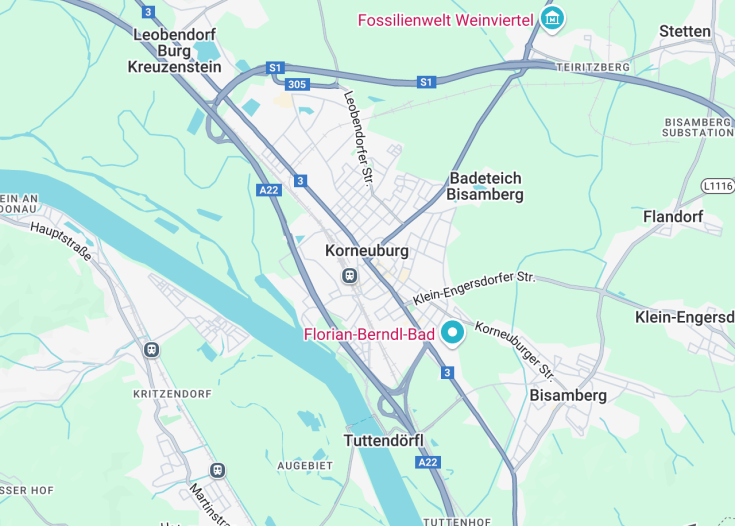Nestled in the scenic state of Lower Austria, Korneuburg boasts a rich historical tapestry and charming architectural landmarks. This picturesque town lies along the banks of the Danube River, offering stunning views and a tranquil atmosphere. Korneuburg’s well-preserved medieval center, highlighted by the Gothic Parish Church of St. John the Baptist, stands as a testament to its storied past. The town is an idyllic starting point for exploring the wine regions and cultural heritage of Lower Austria, making it a captivating destination for history buffs and nature enthusiasts alike.
For the best local experience, visit Korneuburg during the lively annual town festival, which showcases traditional music, dance, and regional cuisine.
Ensure to take a guided walking tour of the historic town center to fully appreciate the intricate details of Korneuburg’s Gothic and Baroque architecture.
Top things to do & see in Korneuburg
Select the following sights and activities to discover best tickets and tours available in Korneuburg.
Korneuburg: Gateway to Vienna’s Countryside
| Country | Austria |
| Time in Korneuburg | GMT+1 |
| Language spoken | German |
| Population | 13,740 (as of 2021, source: Statistik Austria) |
| Currency | Euro (€, EUR) |
| Airports |
|
Korneuburg, situated in the northeastern part of Austria, serves as a picturesque gateway between the urban sprawl of Vienna and the tranquil landscapes of the Weinviertel region. Historically, it was established as a fortress to guard Vienna against potential threats coming from the north. Today, it stands as a vibrant small town that expertly balances modern lifestyle demands while preserving its medieval charm. The town’s history is deeply intertwined with the Danube, allowing it to thrive as a significant port and trading hub over the centuries.
As visitors wander through the quaint streets of Korneuburg, they are treated to beautifully preserved Gothic and Baroque architecture, with the town’s landmark, the imposing Parish Church of St. Vitus, dominating the skyline. This architectural marvel not only reflects the town’s rich history but also its cultural significance over the ages.
The vitality of Korneuburg is also evident in its cultural scene, filled with events and festivals that blend tradition and modernity. The annual Korneuburger Festwochen, a festival stretching over several weeks, showcases a wide range of artistic and musical performances that draw both locals and tourists alike.
Korneuburg’s natural surroundings, especially the floodplain forests along the Danube, offer abundant recreational activities. Nature enthusiasts and active travelers will find biking and hiking trails that offer scenic views and peaceful retreats from city life. Additionally, the nearby Donau-Auen National Park is a haven for eco-tourists seeking to experience the biodiversity of one of Europe’s last remaining floodplain landscapes.
With its close proximity to Vienna, Korneuburg benefits from excellent transport links, yet it maintains a serene environment that feels worlds apart from the hustle and bustle of the capital. The blend of natural beauty, historical sites, and a warm community makes Korneuburg a must-visit for anyone exploring this part of Austria.
Where is Korneuburg?
Korneuburg is strategically located on the northern banks of the Danube River, just 12 miles northwest of Vienna, Austria’s capital.
Distances:
| Route | Distance by car | Time by car |
|---|---|---|
| Vienna to Korneuburg | 21 km | 25 min |
| St. Pölten to Korneuburg | 63 km | 40 min |
What is Korneuburg famous for?
Korneuburg is renowned for its well-preserved medieval architecture, vibrant cultural scene, and scenic natural environments. It acts as a cultural hub with festivals and historical landmarks, attracting visitors from all over the region.
History
The history of Korneuburg, a captivating town in Austria, provides an intriguing glance into the evolution of a European medieval town into a modern community.
Before 1136: Early Settlements
The region where Korneuburg sits has been inhabited since the Neolithic age, showing signs of continuous human presence and development. The strategic location on the Danube River made it a focal point for prehistoric trade routes.
1136-1500: Foundation and Medieval Growth
Korneuburg was officially founded in 1136 when it was mentioned as a fortified settlement in historical documents of the period. The town’s favorable position along the Danube made it an important trading post. Over the centuries, Korneuburg played a pivotal role in regional politics and economy, experiencing significant growth and being fortified with walls and towers.
1500-1800: Military and Economic Developments
During this period, Korneuburg continued to develop its infrastructure and fortifications due to frequent military campaigns in the region. It became a notable military outpost in various conflicts, including the Turkish sieges and the Napoleonic Wars.
1800-Present: Modernization and Contemporary Era
Post the industrial revolution, Korneuburg evolved significantly, integrating modern industries and transport systems, which transformed it into a vital industrial hub. Today, Korneuburg combines its rich historical heritage with modern amenities, making it a unique blend of the old and the new.
Visit Korneuburg
What to see and do in Korneuburg
Explore the historic charm and modern attractions of Korneuburg. Notable places to visit include:
- The Korneuburg Castle, offering insights into the town’s medieval past.
- The Town Museum, which houses artifacts and exhibits on local history.
- Stroll along the scenic Danube River for picturesque views and relaxation.
Partake in outdoor activities like hiking and biking in the surrounding natural landscapes.
Cultural Festivals and Events
Korneuburg hosts several cultural festivals and events throughout the year, such as the Korneuburg Fest in June, celebrating the town’s rich history and culture with music, food, and traditional performances.
Best time to visit Korneuburg
The ideal time to explore Korneuburg is during spring (April to June) and fall (September to October) when the weather is pleasant, and the natural scenery is at its most vibrant.
Is Korneuburg worth visiting?
Korneuburg is definitely worth visiting for those who appreciate the melding of historic and modern charms. With its rich history preserved in architecture and museums, coupled with vibrant cultural scenes and scenic natural surroundings, Korneuburg offers a well-rounded experience for all types of travelers.









